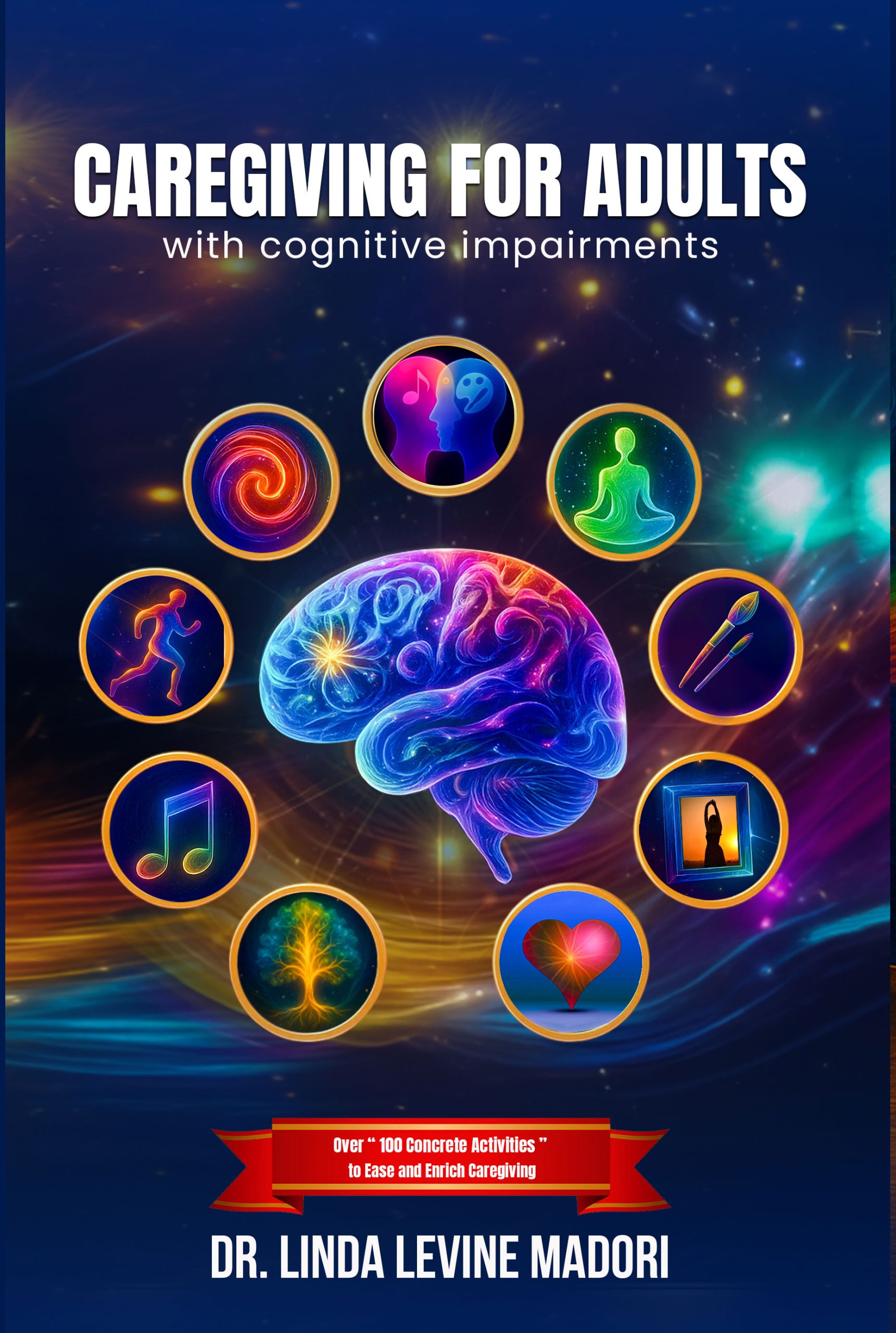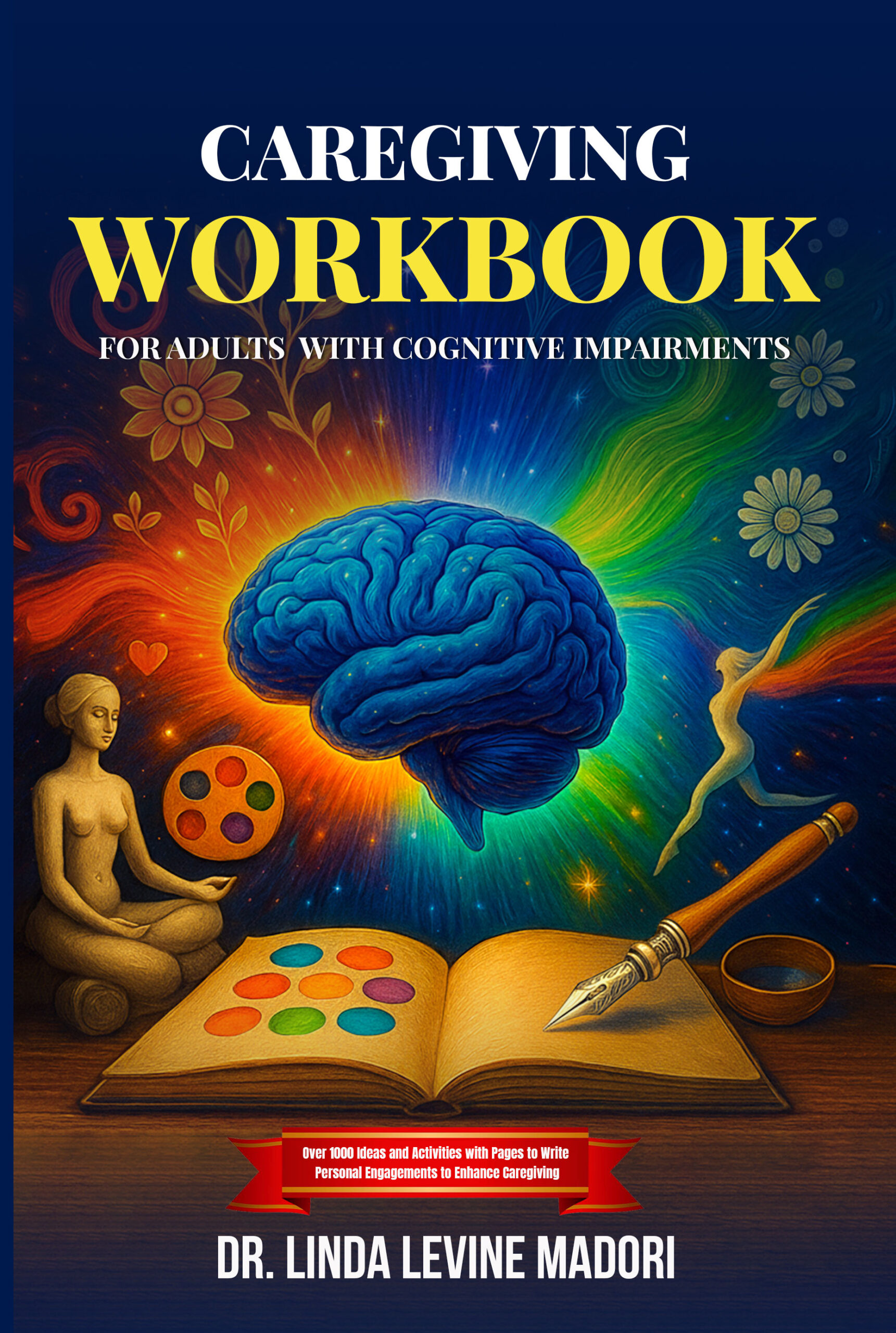Linda Levine Madori, PhD, has worked in the field of Healthcare as a professor, therapist, advisor, researcher, supervisor, and innovator of new psychological approach, the TTAP Method® which utilizes the arts, the brain, and cognition. The first in her family to go to college, Linda earned a bachelor’s degree at City University and took a job at Montefiore Hospital. It was there that she met an art therapist and was inspired to learn more about the field. So, she returned to school and eventually earned both a master’s and post-master’s degree in therapeutic science and creative art therapy. Later, she pursued a doctorate in health studies at New York University and began teaching.
At St Thomas Aquinas College, she received the title of tenured full Professor in 2005, and enjoys teaching students both in the classroom and through real-world experiences at local assisted living and memory care facilities such as the Promenade at Blue Hill in Pearl River, NY. Linda remembers how exhilarating it was to see the significant effects art and recreational activities had on residents at two nursing homes she worked at earlier in her career. “I love art, and I was able to bring it into these people’s lives,” she says. Now, she finds it fulfilling to pass that on to students and to give them the tools and skills to go on to rewarding careers helping others.
She recently published two new publications, “Caregiving for Adults with Cognitive Impairments” and the accompanying “Workbook for Adults with Cognitive Impairments” which offer a new approach to communication and socialization for both the caregiver and the client. It is a research-based approach that uses art, music, and reminiscing to engage the brain enhancing emotional connections. The caregiver workbook offers pages for the caregiver to document conversation and memories during all interventions.
In her down time, Linda paints, sculpts, and enjoys the outdoors. She especially likes going off-grid to spend time with her four children and seven grandchildren at her vacation home on the Jersey Shore. “I have been very blessed,” she says. “Spending days with them at the ocean is magical.”
EDUCATION
B.F.A. from Lehman College, M.S., CUNY (CTRS), Graduate Creative Arts Therapies, Pratt Institute (ATR-BC), Ph.D. from New York University, Health Studies, Licensed Creative Arts Therapist (LCAT)
PUBLICATIONS
Levine-Madori, L. (2025) Caregiving for Adults with Cognitive Impairments. Workbook for Adults with Cognitive Impairments.
Levine-Madori, L. (2017) TTAP Method® Applied to Individuals Diagnosed with Alzheimer’s. In Art and Expressive Therapies within a Medical Model: Clinical Approaches, Routledge Publishers.
Levine-Madori, L. (2014-2016) Writer and Editor for Creative Forecasting; quarterly Therapeutic Recreation Column titled “Ask Dr. Linda”. This magazine is disseminated to over 12, 000 Directors of Therapeutic Recreation programs in the US and internationally.
Levine-Madori, L. et al. (2016). Meditation and TTAP Method® with Residents Diagnosed with Early Stage Alzheimer’s Disease. Journal of Alzheimer’s, Parkinsonism & Dementia, April 29, 2016.
Levine-Madori, L. (2014). A structured Approach to Therapeutic Recreation, published in the updated revised book titled Therapeutic Recreation Methods (Revised Edition 2014), Ann Harbor Publishers, December 2014.
Levine-Madori, L. (2013). Utilizing The TTAP Method in Diverse Populations, published chapter in – Cultural Diversity in Art Therapy; Crossing Cultural Boundaries and Abilities, Jessica Kingsley Publishers, July, 2013
Levine-Madori, L. (2012). Transcending Dementia; A New Psychology of Art, Brain and Cognition, Health Professionals Press, Baltimore, Maryland. www.healthpropress.com
Levine-Madori, L. (2007). Therapeutic Thematic Arts Programming Workbook for Healthcare Professional. Self published,
Levine-Madori, L. (2007). Therapeutic Thematic Arts Programming for Older Adults (TTAP), Health Professionals Press, Baltimore, Maryland. Publication date December 2006.
www.healthpropress.com
Health Professional Press Educational Seminars on Site; The TTAP Method™ Certification Course. http://www.healthprogessionspress.com/sos.
Levine-Madori, L. (2009). Using the TTAP Method for Cognitive and Psychosocial Wellbeing, American Journal of Therapeutic Recreation, Weston Mass. (July, 2009).
Levine-Madori, L. (2009). Students at St. Thomas Aquinas College, Researching the TTAP Method© at Bergen Regional Medical Center. American Therapeutic Recreation Research Institute, October, 2009.
Levine-Madori, L., Alders, A. (2010).The effect of Art Therapy on Cognitive Performance of Hispanic/Latino Adults. American Art Therapy Journal, Sept, 2010.
Levine-Madori, L. (2010). Therapeutic Thematic Arts Programming (TTAP) For Caregivers of Individuals with Alzheimer’s Disease, self published
Levine-Madori, L. (2010). Therapeutic Thematic Arts Programming (TTAP) For Caregivers of Individuals with Alzheimer’s Disease, self published
Levine-Madori, L. (2012). Transcending Dementia through the TTAP Method: The New Psychology of Art, Brain, and Cognition. Health Professionals Press, Baltimore, Maryland.. September www.healthpropress.com
Levine-Madori, L., Melville, L.,Stickney, G.,Paduto,D.,Rodriguez,J. (2016).Meditation and the TTAP Method® with Residents Diagnosed with Early Stage Alzheimer’s Disease. Journal of Alzheimer’s, Parkinsonism and Dementia, April 29,Vol.1, issue,1,www.scienceonline.org.
RECOGNITION
Since 1991, Dr. Levine Madori has been a People to People Ambassador Leader and has presented papers and lectured extensively in nine countries including Finland, Spain, Switzerland, Indonesia, Lithuanian, Prague, Russia, China and Italy. Her dissertation research in Alzheimer’s disease, cognitive functioning, and psychosocial well-being is the basis for Therapeutic Thematic Arts Programming for the Older Population (TTAP Method). Having credentials in both Therapeutic Recreation (M.S., Ph.D.) and New York State Licensing in Creative Arts Therapy (ATR-BC#000971-1), she has had the unique experience to be professionally active on the state level and internationally in moving both professional fields forward into the 21st century. She has chaired the Leisure and Aging Track of the American Society on Aging, served on the Leisure and Aging Section of the National Recreation and Park Association, developed professional educational intensives for the American Art Therapy Association, and implemented workshops and professional panel presentations for educators, therapists and psychotherapists as an Ambassador Leader to the People to People International Educational Program.
In September 2006, Dr. Levine Madori was awarded her first Fulbright Senior Specialist Scholarship and was invited to teach her new and innovative therapeutic approach in both New Zealand at Waikato University and in Australia at Victoria University from February to May, 2007. In 2009, she received a second Fulbright Specialist Award through the Finland Fulbright Office to create and teach a certificate course on the TTAP Method to health professionals in Finland through three Universities: HAMK University of Applied Sciences, SEAMK University of Applied Sciences, and the University of Tampere. Dr. Levine Madori was recognized for her service in the field of Therapeutic Recreation by the New York State Therapeutic Recreation Association receiving the Distinguished Service Award in April, 2007.
2007 Fulbright Award International Teaching and Lecturing Invitations
Waikato University: Hamilton, New Zealand
Victoria University: Melbourne, Australia
Keynote Speaker: The National Alzheimer’s Association of New Zealand
Keynote Speaker: The National Diversity Association, Melbourne, Sidney and Brisbane, Australia
Educational Consultant: Melbourne Alzheimer’s Association
Melbourne Museum of the Arts, City Center, September 2007 (Taped interview on the TTAP Method for National Alzheimer’s Awareness Month)
2009 Fulbright Award International Teaching and Lecturing Invitations
HAMK University of Applied Sciences, Hameenalinna, Finland
Seinajoki University of Applied Sciences, Seinajoli, Finland
University of Tampere, Tampere, Finland
Keynote Finnish Alzheimer’s Association, Helsinki, Finland
Certificate Course in the TTAP Method, Continuing Education, HAMK University
Therapeutic Recreation

